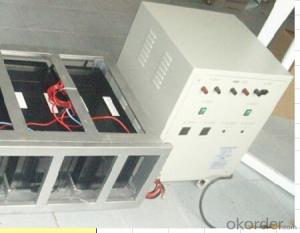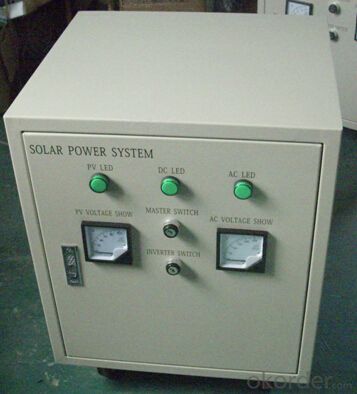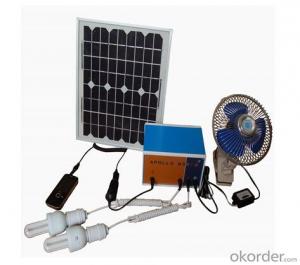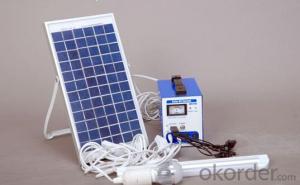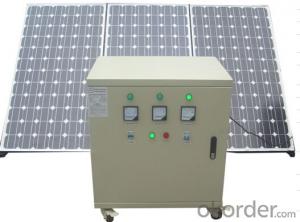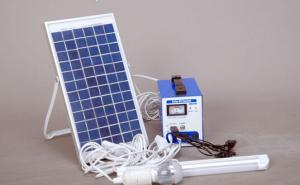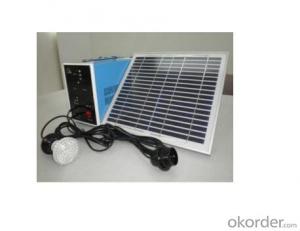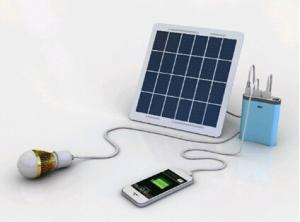CNBM Solar Home System Roof System Capacity-3000W - Solar Energy Systems NY
- Loading Port:
- Shanghai
- Payment Terms:
- TT or LC
- Min Order Qty:
- 5 pc
- Supply Capability:
- 30000 pc/month
OKorder Service Pledge
OKorder Financial Service
You Might Also Like
Introduction of Solar Home System
Solar Home System is composed by Solar Panels, Inverters, Charger Controller, Battery, Cable, Mounting Bracket, which is applied to produce electricity for home use.
Solar Home System is quite suitable product in urban area and the place which is short of electricity. Our Small Solar Home System own great benifits compare with other kind electricity resources:
Electricity generating cost of Solar Home System is much cheaper than diesel engine. Beside low electricity making cost, solar system products also have the features of noiseless, clean energy, environmentally friendly and can access to many different electric appliance.
Picture of Our Factory

Working Principle of Solar Home System
The stand alone Solar Home System is an off-grid solar system which uses batteries to store the solar energy. Stand alone solar system solutions design for those who are not able or willing to connect to electricity grid.
However, our on-grid solar home system can be connected to the grid for utilization of grid electricity power. Our solar system can add relative equipment as our customer’s requirement which have the function of switching to city electricity automatically. The solar system can use battery power in priority, if sunshine is not so good or loads consumption is too high which cause battery power insufficient. Then system can switch automatically to grid power supply. Meanwhile, the system can charge the batteries with grid power until batteries are fully charged. Then the solar system will switch back to battery power supply.
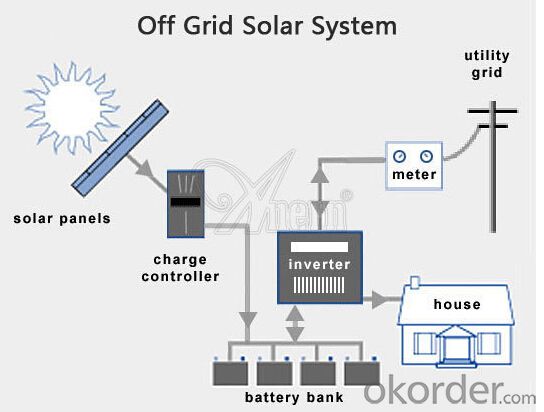
Product Details of Solar Home System
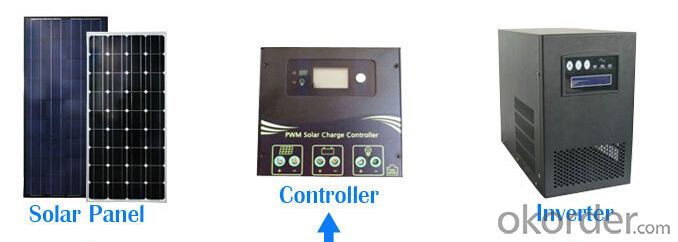
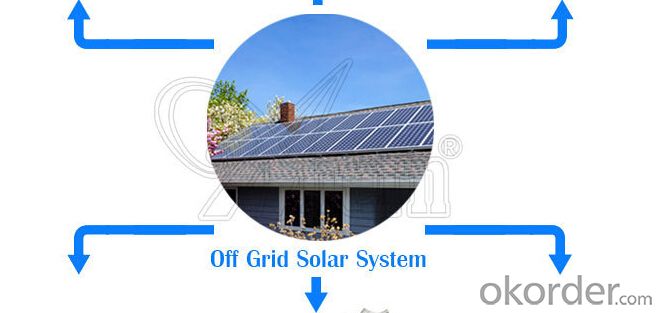

Specification of Solar Home System
Technical data: | ||||||||
Inverter | Rated load power | 3000W | ||||||
Output wave | Pure sine wave | |||||||
Input voltage | 48V | |||||||
Output voltage | DC:12V | |||||||
Output frequency | 50HZ/60HZ | |||||||
Precision of output frequency | ±6% | |||||||
Solar panel | Pmax | 250W*12PCS | ||||||
Vmp | 36V*2*6 | |||||||
Imp | 7A*6 | |||||||
Charger controller | Charger voltage & current | 48V/30A*3PCS | ||||||
Battery | Capacity | 12V/150AH*8PCS | ||||||
support | aluminium | 2PCS/SET*6 | ||||||
Power box | Spray paint iron box,with input,output, ammeter,voltmeter,master switch and so on. | |||||||
Package data: | ||||||||
Part | Size (L*W*H mm) | Weight (kg) | 20' (pcs) | 40' (pcs) | ||||
Power box | 580*520*540 | 70 | 48Sets | 240Sets | ||||
Solar panel | 1970*1010*110*(6ctns) | 180 | ||||||
Battery | 1100*520*650 | 600 | ||||||
Loading electrical equipment(For consulting) | ||||||||
Name of Load | Power(W) | Quantity | Working Time per Day (H) | Working Days | ||||
Color TV | 65W | 2 | 6 | 3 days | ||||
Satellite TV Receivers | 25W | 2 | 6 | 3 days | ||||
lamp | 11W | 8 | 8 | 3 days | ||||
Computer | 150 W | 2 | 6 | 3 days | ||||
FAN | 60W | 4 | 6 | 3 days | ||||
Other | 1000W | 1 | 6 | 3 days | ||||
Terms and Conditions
1. Trade terms: FOB Shanghai
2. Payment terms: 30% T/T, balanced before shipment/ LC at sight before shipment. Actual Terms can be negotiated for big order.
3. Package: Exported standard package suitable for tough handling and sea transport.
4. Delivery: Goods to be ready within 10~30 days depending on order quantity.
5. Warranty: 10 years for solar panel, 2 years for controller/inverter/battery.
- Q: How does solar energy work?
- Solar energy works by harnessing the power of the sun's rays and converting them into usable electricity. This process involves the use of solar panels, which contain photovoltaic cells that absorb sunlight and release electrons, creating an electric current. The generated electricity can then be used to power various devices or stored in batteries for later use.
- Q: Are there any risks of electrical fires with solar energy systems?
- Solar energy systems, although generally regarded as safe, do pose potential risks of electrical fires. The improper installation or maintenance of the system stands as one of the primary hazards. Inadequate wiring or faulty electrical connections can result in overheating and fire hazards. Moreover, insufficient grounding of solar panels or system faults can also heighten the likelihood of electrical fires. Hence, it is vital to enlist the services of qualified professionals for both installation and regular maintenance of solar energy systems, effectively minimizing these risks. To further diminish the chances of electrical fires, it is crucial to adhere to fire safety measures, including the use of appropriate wiring, the installation of proper fire detection and suppression systems, and ensuring sufficient ventilation surrounding the solar panels. Consequently, despite solar energy systems generally being safe, it is imperative to acknowledge these risks and implement necessary precautions to mitigate them.
- Q: Can a solar energy system be installed on a museum or cultural institution?
- Yes, a solar energy system can be installed on a museum or cultural institution. Solar panels can be mounted on the roof or in an open space surrounding the building to harness sunlight and convert it into electricity. This can help the institution reduce its reliance on conventional energy sources, lower its carbon footprint, and potentially save on electricity costs in the long run. Additionally, the installation of solar panels can also serve as an educational display, highlighting the institution's commitment to sustainability and renewable energy.
- Q: How do solar energy systems impact the structural integrity of a building?
- Solar energy systems can have a minimal impact on the structural integrity of a building. The installation of solar panels requires proper planning and engineering to ensure that the additional weight and any penetrations made do not compromise the building's structure. When installed correctly, solar energy systems can actually provide additional support and protection to the roof, making it more durable and extending its lifespan.
- Q: How does the efficiency of solar panels vary across different climates?
- Solar panel efficiency can differ in various climates due to a range of factors. The availability of sunlight is one of the key factors. Solar panels function by converting sunlight into electricity, so regions with higher levels of sunlight generally have higher solar panel efficiency. In hot and sunny climates like deserts or tropical areas, solar panels tend to perform exceptionally well. These regions receive intense sunlight, providing abundant energy for the panels to convert into electricity. Consequently, solar panels in these climates achieve higher efficiency levels. In contrast, cooler or cloudier climates may result in slightly lower solar panel efficiency. Cloud cover reduces the amount of sunlight reaching the panels, affecting their overall performance. Additionally, colder temperatures can impact the efficiency of solar panels, as they work best in warmer conditions. Nonetheless, solar panels are designed to function in diverse climates and can still generate electricity even in less sunny or colder regions. Technological advancements have led to the development of solar panels that can absorb sunlight even in low-light conditions, thereby increasing their efficiency in less favorable climates. Moreover, climate is not the sole determinant of solar panel efficiency. Other factors such as panel orientation, tilt angle, shading, and the quality of solar cells used also play a significant role. Proper installation and maintenance greatly influence the overall efficiency of solar panels, regardless of the climate. To summarize, solar panel efficiency varies across climates due to factors like sunlight intensity, cloud cover, and temperature. Although solar panels perform better in hot and sunny regions, advancements in technology enable them to generate electricity even in less favorable conditions. Proper installation, maintenance, and consideration of other factors are crucial in maximizing solar panel efficiency across different climates.
- Q: How do solar energy systems affect the roof's lifespan?
- Solar energy systems can actually extend the lifespan of a roof. By acting as a protective shield, solar panels can help to reduce the impact of harsh weather conditions such as rain, hail, and UV radiation on the roof. Additionally, solar panels can provide shade and insulation, thereby reducing the temperature fluctuations that can cause wear and tear on the roof. Overall, solar energy systems can contribute to the longevity and durability of the roof.
- Q: Can solar energy systems be used in remote areas without access to the power grid?
- Yes, solar energy systems can definitely be used in remote areas without access to the power grid. Solar panels can be installed to capture sunlight and convert it into electricity, which can then be used to power homes, businesses, or any other electrical needs. These systems are particularly beneficial in remote areas as they offer a sustainable and reliable source of energy, reducing dependence on traditional power grids and increasing energy independence. Additionally, advancements in battery storage technology allow excess solar energy to be stored and used during nighttime or cloudy days, ensuring a continuous power supply even in these areas.
- Q: How do solar energy systems contribute to reducing greenhouse gas emissions?
- Solar energy systems contribute to reducing greenhouse gas emissions in several ways. Firstly, they generate electricity without burning fossil fuels, which are the primary source of greenhouse gas emissions. By relying on the sun's energy, solar systems eliminate the need for power plants that release carbon dioxide and other pollutants. Secondly, solar energy reduces the demand for traditional electricity generation, which often relies on fossil fuels. As solar power becomes more widespread, the overall carbon footprint of the energy sector decreases. Lastly, solar energy systems can be integrated into buildings, reducing the need for energy transportation and transmission, which further minimizes greenhouse gas emissions. Overall, solar energy systems play a crucial role in transitioning to a cleaner and more sustainable energy future, helping to combat climate change and reduce greenhouse gas emissions.
- Q: What is the maintenance cost of a solar energy system?
- The maintenance cost of a solar energy system can vary depending on several factors such as the size of the system, the type of components used, and the location of the installation. Generally, solar energy systems have minimal maintenance requirements and are considered to be low maintenance compared to other forms of energy generation. Regular maintenance tasks for a solar energy system may include cleaning the solar panels to ensure optimal performance, inspecting the wiring and connections for any damage or loose connections, and checking the inverter for proper functioning. These routine maintenance activities can typically be performed by the system owner or a professional technician. In terms of cost, the maintenance expenses for a solar energy system are typically quite low. The cleaning of solar panels can usually be done with basic equipment and materials, and the frequency of cleaning may vary depending on the level of dust or dirt accumulation in the area. Any necessary repairs or replacements of components may incur additional costs, but these instances are relatively rare, especially with high-quality solar systems. It is important to note that many solar energy system manufacturers offer warranties that cover the cost of repairs or replacements for a specified period. Additionally, some solar energy system owners choose to invest in service contracts or maintenance plans to ensure regular inspections and upkeep of their systems. Overall, while there are some maintenance requirements associated with a solar energy system, the costs are generally low in comparison to the long-term benefits and savings provided by the system's clean and renewable energy generation.
- Q: Can solar energy systems be used to power remote locations?
- Yes, solar energy systems can definitely be used to power remote locations. In fact, solar energy is particularly well-suited for remote applications where access to the conventional power grid may be limited or non-existent. Solar panels can be installed in remote areas that receive adequate sunlight, allowing for the generation of electricity even in off-grid locations. Solar energy systems for remote locations typically consist of photovoltaic (PV) panels, which convert sunlight into electricity, and a battery storage system to store excess energy for use during non-sunlight hours. In this way, solar energy can provide a reliable and continuous power supply even in areas without access to the grid. Remote locations such as rural communities, remote research facilities, off-grid cabins, and telecommunications towers can benefit greatly from solar energy systems. They offer a sustainable and renewable source of energy, reducing reliance on fossil fuels and reducing environmental impact. Additionally, solar energy systems require minimal maintenance and are cost-effective in the long run, making them an ideal solution for powering remote locations.
Send your message to us
CNBM Solar Home System Roof System Capacity-3000W - Solar Energy Systems NY
- Loading Port:
- Shanghai
- Payment Terms:
- TT or LC
- Min Order Qty:
- 5 pc
- Supply Capability:
- 30000 pc/month
OKorder Service Pledge
OKorder Financial Service
Similar products
Hot products
Hot Searches
Related keywords
